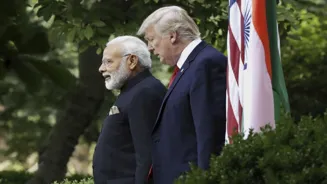Soon after the trade negotiations between India and the US began, India avenged the attack by Pakistani terrorists on Hindu tourists in Kashmir by striking Pakistan’s terror camps. The skirmish further escalated as India struck Pakistani airbases as Pakistan attempted to send armed drones and loaded missiles towards Indian cities.
The Indian strikes halted when Pakistan requested a ceasefire from India in direct, bilateral communication with the Indian military. Had Pakistan not called India directly, in the absence of a bilateral request, India would have continued its mission to wipe out all terror infrastructure in Pakistan. This is because of India’s unflinching policy of not accepting international mediation on any Kashmir-related issue in particular or India-Pakistan matters in general.
India burnt its hands in the early days of its birth when the first prime minister, Jawaharlal Nehru, took the Kashmir issue to the United Nations on the insistence of the outgoing British government. India witnessed how the international frameworks and multilateral bodies were manipulated by Pakistan and other vested powers to disturb India’s internal peace and security. Thus, at the first chance it got after the 1971 Bangladesh Liberation War with Pakistan, the then Indian prime minister, Indira Gandhi, along with the Pakistani leadership, negotiated and signed the Simla Agreement of 1972, confirming that any issues between India and Pakistan would henceforth only be solved bilaterally.
This agreement also confirmed all previous international interventions as closed, established an agreed-upon Line of Control (LoC) and stipulated that all future solutions would only be discussed and sought after in bilateral negotiations. While Pakistan repeatedly violated this agreement, with no real success, once again in 1999 the Lahore Declaration between the leadership of both countries enforced the understanding of solving conflicts only through bilateral mechanisms.
In this context, when President Trump made repeated claims about having successfully mediated the India-Pakistan conflict, it put India in a difficult spot. While Prime Minister Modi and President Trump shared a warm camaraderie since Trump 1.0, India simply could not accept the US’ mediation in its most sensitive Kashmir issue.
As India began to clarify its stance that there was no US mediation, Pakistan used its international lobbies to use this opportunity to create distrust amongst the US leadership towards India. India’s reluctance to accept mediation was not personal, but its long-standing national policy.
Pakistan offered its strategic assets to the United States; its field marshal, Asim Munir, dined with Trump, particularly when the US was in a direct conflict with Iran. And Islamabad, in a few weeks, also closed the trade deal with Washington.
With new negative emotions created within the US’ leadership circles compounded with the roadblocks that the US and India teams negotiating the trade deals were hitting, the relationship between the two countries became mired in complexities. A 50 per cent tariff announcement by Trump and his recent statements on the Indian economy being 'dead' hit a new low point in the US-India relationship, which has taken decades of work on both sides to build. India and the US are strategic partners — both need each other for several security, trade and other important objectives.
India is a reliable partner for the US in the Asia-Pacific, and India has increasingly looked to the US as a strong ally. Targeting India, which has cautiously increased its business with the US gradually, with a 50 per cent tariff will only push it closer to Russia and China—a move counterproductive to the US’ interests. If the US wants to maintain its foothold in the Global East, India is its best bet because only India has the size and consumption power to purchase and use the US’ goods and services in significant volumes.
While Nato and the EU, as well as the US, continue to consume Russian goods and energy, the Trump administration’s punitive tariffs on India don’t seem fair. They certainly seem biased and almost personal. The leadership of both countries needs to consider the impact of interpersonal emotions driven by lobbies surrounding them and act in a responsible manner in the interest of global stability and growth.
The author is the director and founder of the VishwaMitra Research Foundation – a geo-economic, foreign policy think tank in Mumbai. Views expressed in the above piece are personal and solely those of the author. They do not necessarily reflect Firstpost’s views.
















